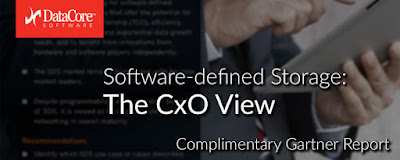Download this complimentary Gartner report Software-defined Storage: The CxO View – featuring the Top Five Use Cases and Benefits of Software-defined Storage – and learn how it can help grow your business while reducing TCO.
Agile, cost-effective data infrastructure for today’s business climate
Welcome Fellow CxO,
 Today’s business climate carries a great deal of uncertainty
for companies of all sizes and industries.
To seize new business models and opportunities, systems must be flexible
and easily adjusted in order to respond to growth spurts, seasonality and peak periods.
Likewise agility helps us mitigate risk .With the sluggish economies across the
world, there is a need to be prepared to react quickly to changing
fortunes. From cutting back when needed
to rapidly growing when opportunities present themselves, companies are less
focused on long-term planning in favor of quick decisions and meeting quarterly
expectations.
Today’s business climate carries a great deal of uncertainty
for companies of all sizes and industries.
To seize new business models and opportunities, systems must be flexible
and easily adjusted in order to respond to growth spurts, seasonality and peak periods.
Likewise agility helps us mitigate risk .With the sluggish economies across the
world, there is a need to be prepared to react quickly to changing
fortunes. From cutting back when needed
to rapidly growing when opportunities present themselves, companies are less
focused on long-term planning in favor of quick decisions and meeting quarterly
expectations.
Technology is changing business dynamics as well. Social, mobile and cloud are impacting
companies’ operations, meaning they need to be able to meet changing demand
24x7. This has put a premium on
companies’ ability to react quickly while being able to absorb and analyze all
the data they are gathering.
In survey after survey, CxOs highlight the following
challenges when it comes to IT:
+ Dealing with the rapid growth of data
+ High cost of storing this data
+ Delivering high-performance applications
+ Meeting Business Continuity / Disaster Recovery
requirements
When looking at IT infrastructure, it’s pretty clear that
compute and networking have taken the lead in meeting these demanding
requirements. But, storage is a laggard.
Enter Software-defined Storage (SDS). Aside from being the latest buzzword, what is
SDS and will it help companies like yours succeed?
Put simply, SDS delivers agility, faster time to respond to
change and more purchasing power control in terms of cost decisions. Gartner defines SDS as “storage software on
industry-standard server hardware [to] significantly lower opex of storage
upgrades and maintenance costs… Eliminates need for high-priced proprietary
storage hardware”.
Our own research based on thousands of customers real-world
feedback shows a growing interest in SDS.
By separating the storage software from storage hardware, SDS is able
to:
+ Pool data stores allowing all storage assets and
their existing and new capacity investments to work together ;enabling
different storage devices from different vendors to be managed in common
+ Provide a comprehensive set of data services
across different platforms and hardware
+ Separate advances in software from advances in
hardware
+ Automate and simplify management of all storage
The benefits to your company are potentially enormous. In a recent survey of over 2000 DataCore customers that have deployed SDS, key findings include:
79% improved performance by 3X or more
83% reduced storage-related downtime by 50% or more
81% reduced storage-related spending by 25% or more
100% saw a positive ROI in the first year
It’s these kind of results and the advances in performance and efficiency due to DataCore’s revolutionary Parallel I/O technology within our SDS solution that have led to over 30k customer deployments globally and 96% of CxOs surveyed stating they recommend DataCore SDS.
83% reduced storage-related downtime by 50% or more
81% reduced storage-related spending by 25% or more
100% saw a positive ROI in the first year
It’s these kind of results and the advances in performance and efficiency due to DataCore’s revolutionary Parallel I/O technology within our SDS solution that have led to over 30k customer deployments globally and 96% of CxOs surveyed stating they recommend DataCore SDS.
Sincerely,
George Teixeira,
President and CEO, Co-founder
